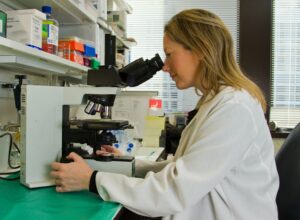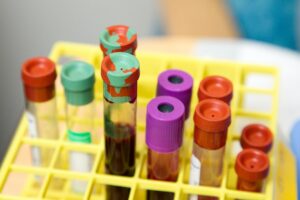Doctors at University Hospital Southampton (UHS) have launched a new self-referral service for men who have symptoms of prostate cancer or are at higher risk of developing it.
It comes following a “dramatic drop” in referrals which led to a decrease of 23 per cent in men starting treatment across the region at the height of the Covid-19 pandemic.
 Although referrals have increased in recent weeks, experts say there are still many men “missing” from the usual numbers seen in clinic.
Although referrals have increased in recent weeks, experts say there are still many men “missing” from the usual numbers seen in clinic.
The project focuses on improving access to specialists, raising awareness of early symptoms and information about testing.
If considered high risk after completing an initial assessment questionnaire, men will be offered a range of investigations without the need for a GP referral.
These include a blood test known as a prostate specific antigen (PSA) test which measures levels of a protein in the blood that is only found in the prostate gland and is often elevated in men with this form of cancer.
They will also be offered other tests if required, such as scans, urinary function assessment and prostate biopsies.
It is estimated that one in eight men will be diagnosed with it in their lifetime and more than 11,500 die from the disease every year in the UK.
Prostate symptoms or lower urinary tract symptoms (LUTS) can include slow urine flow, going frequently, getting up at night, difficulty emptying the bladder or blood in the urine.
Men with early disease often have no symptoms while those who do suffer symptoms could find they are related to prostate enlargement, though they can also occur with advancing prostate cancer.
Doctors are hoping the new system will combat the drop in referrals by allowing men to access the specialist service directly while also helping to reduce pressure on primary care settings such as GP practices.
Tim Dudderidge, consultant urological surgeon at UHS who is co-leading the pilot scheme, said: “The dramatic drop in referrals caused by the Covid pandemic means far more men are living with high grade prostate cancer with the potential to spread without knowing it which is very worrying.
“Unfortunately, many of these missing men won’t be referred to our clinic until the cancer has spread and curative treatment is no longer an option.
“That’s why we’re committed to raising awareness of the disease and developing a new self-referral system that will make it easier for men who are at higher risk to access our service with ease.”
With improved and earlier diagnosis, men can be offered a wider range of options such as active surveillance, less invasive high intensity focused ultrasound or cryotherapy – which freezes and kills cancer cells – for smaller cancers.
The service at UHS also provides access to MRI-guided biopsy, robotic surgery and image-guided radiotherapy for those with more advanced disease.
 Men can self-refer to UHS by emailing prostatehealthtest@uhs.nhs.uk where they will receive an automated response with information and a prostate cancer risk assessment questionnaire.
Men can self-refer to UHS by emailing prostatehealthtest@uhs.nhs.uk where they will receive an automated response with information and a prostate cancer risk assessment questionnaire.
If they wish to proceed to testing they can request an appointment for a PSA test and nurse-led urinary assessment.
If this assessment highlights the need for further investigation, an MRI will be performed to determine if a cancer is present or advice and treatment of urinary symptoms will be provided.
Men are also able to check their PSA results and see clinic letters using the My Medical Record app which is free and available to any patient who has used services at UHS.
Amy Rylance, head of improving care at Prostate Cancer UK, who is supporting the initiative, said: “The Covid pandemic has resulted in far fewer men speaking to their doctor about their risk of prostate cancer. As a result there are 13,000 missing men with prostate cancer who have not been diagnosed.
“This self-referral service is a great opportunity for men in the Southampton area to understand their personal risk of prostate cancer and the pros and cons of the PSA test, as well as getting bothersome urinary symptoms investigated.”
